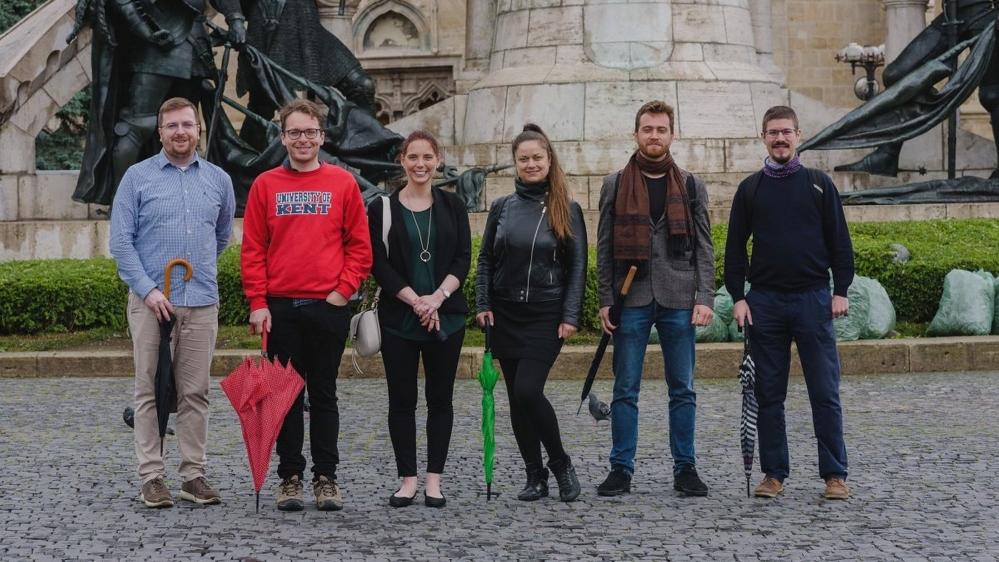(Az interjú magyar verziója elérhető: ITT.)
Nicole she grew up in the USA and was strongly influenced by Hungarian issues, as her father fled Hungary during the Communist era. Although she never managed to learn Hungarian, she has always felt very American and Hungarian at the same time.
When first traveling to Hungary, she realized how Hungarian was the home in which she grew up. Even though they didn't speak the language at home, they kept many customs and their home had embroideries, traditional clothes, and meticulously crafted plates on the walls. Besides, she was also brought up in the spirit of the Hungarian work ethic and finds Hungarians to be hard-working and honest people.
She feels that her research about the various aspects of Hungarian minority rights, especially that of Hungarians in Transylvania, is very complex and that the fact that she is from the United States adds a new perspective.
Unfortunately, due to the pandemic, it was mainly through books and interviews that have helped to expand her knowledge on the subject, but now that the borders have been opened, she has the opportunity to come here, visit Hungarian communities and do interviews with locals.
In Transylvania, there's a strong sense of Hungarian identity
Nicole’s initial aim was to better understand the Hungarian communities in general in countries such as Slovakia, Serbia, Ukraine and Romania. However, she felt it was worth narrowing down her research area, and so the focus shifted to Transylvania. Nevertheless, she also keeps an eye on what is happening in other countries.
This decision was fostered by the struggle for identity preservation in Transylvania is particularly intense. It was the large, politically active Hungarian community and its struggle to preserve its identity in Transylvania that led her to study this region. Transylvania has a long history and this helps its self-identification, to which must be added the preservation of its culture and language. She finds that there is an intense sense of Hungarian identity in Transylvania.
- the lawyer admitted.

Nicole Nemeth
Much more international attention is focused on other minority groups than on historical ethnic minorities
Despite her reluctance to express a personal opinion on the issue of autonomy, she said that she did not consider it impossible for territorial autonomy to be established, given the many examples in Europe of autonomy as a model of peaceful coexistence. That said, the issue of territorial autonomy is a very complex one.
She believes that the biggest obstacle to recognizing the struggles of the various Hungarian minority groups is the lack of knowledge and whether the cause enjoys the support of various larger groups or NGOs, or not.
"Transylvania has been an autonomous region for centuries, so there is a lot of historical experience for the people living here. At the same time, the autonomy issue is not only a minority rights issue, but also a political one today. I feel that there is a much more international focus on other minority groups, and it would be great if the historical Hungarian minority could attract as much international attention as they do" - the lawyer added.
The American perspective: from average people to the State Department
In the United States, when you say Transylvania, it is Dracula that comes to the mind of average people. Nicole Nemeth thinks that the lack of knowledge about this region and the situation of the minorities living here is shocking. This stems from a lack of knowledge about historical minority issues as such. She herself had no idea on the gravity of the situation until she first visited Hungary in her 30s.
For example, her father, who fled Hungary, never visited Transylvania in his life because he never had the opportunity. But it was very interesting for her, that even though he was Hungarian, he was not aware of the details of what was happening here.
Every year, the US State Department's human rights report on Romania lists Hungarian grievances and discrimination against the community, but Washington seems to have stopped calling Romania to account.
Some of Nicole Nemeth's research efforts focuses on these reports, especially those that were published over the past five years. She says, it seems that it is the voice of the Hungarian community in Romania that can be heard the furthest compared to other Hungarian communities in the Carpathian Basin which she has analyzed. "In Ukraine, the Hungarian term does not even appear anywhere in these reports. By contrast, if we look at Romania, the Hungarian point of view is much stronger in these reports, but not strong enough, at least from the perspective of the United States," the researcher stresses.
She also highlights that her research shows that the US State Department seems to give more weight to reports on religious freedom than on human rights. These annual reports detail human rights violations against women, Roma, immigrant and LGBTI groups, but they either remain silent or, in some cases, such as the Ukrainian reports, they omit the issue of rights’ violations against historical minorities (including the Hungarian community). Nicole believes that it is important for the Hungarian community to analyze the ways information can be presented to attract the greatest possible attention to the issues mentioned in the reports.
The real question is how strong the voice of a minority is. Two questions follow from this: 1) is it necessary for the historical minority to use a 'megaphone' to amplify its own voice?; 2) although it is sufficiently able to make its voice heard, are there any large-scale, potentially geopolitical reasons why its voice is not heard on the international stage? These are questions that Nicole has not been able to analyze in detail yet. However, the researcher believes that an analysis of these two issues is essential for those involved in the advocacy of minority groups.
The great problem of the Hungarians in Transylvania is the consistent implementation of the rights already acquired
Nicole Nemeth believes that the exercise of the language rights is the biggest problem for the Hungarian community in Transylvania. These rights are perceived as positive, but they are actually not applied. In addition, the exercise of cultural rights is also problematic: "If the leaders of a Romanian community do not enforce minority rights, but, for example, they take action against Hungarians for the use of flags, the celebration of 15 March, or condemn these Hungarian actions, this creates an atmosphere that leaks down to the level of the members of the community. It is a cause for concern that the local Romanian community may then be emboldened to take action against members of the Hungarian community simply because they are Hungarian."
What she has experienced, when talking to Hungarians in Transylvania, here in Cluj-Napoca, is that there is no anti-Romanian sentiment at the level of the population. Based on her personal experience, she is of the opinion that just because someone is of Hungarian ethnicity in Romania, it does not imply that he or she is anti-Romanian.










